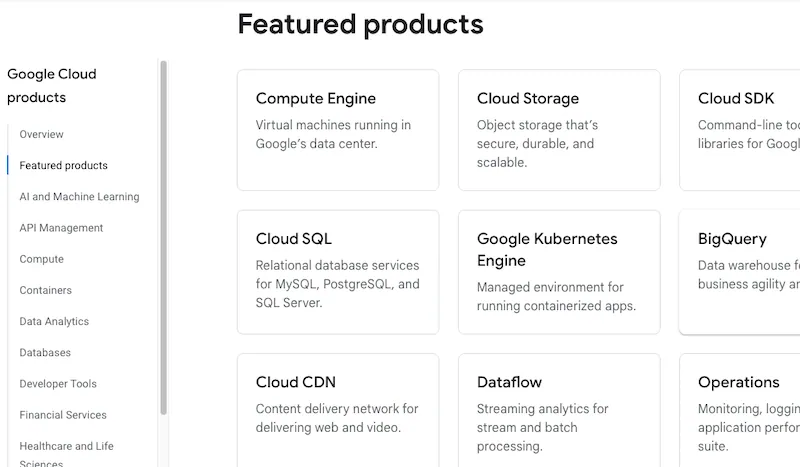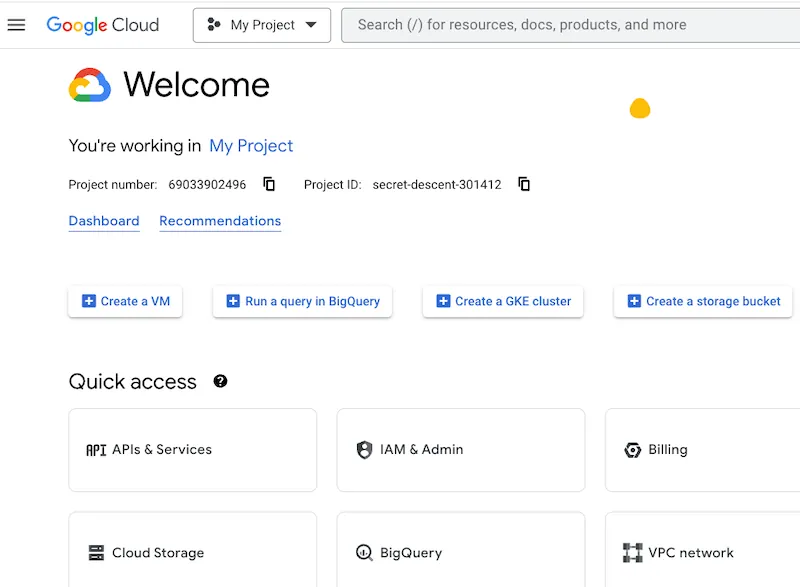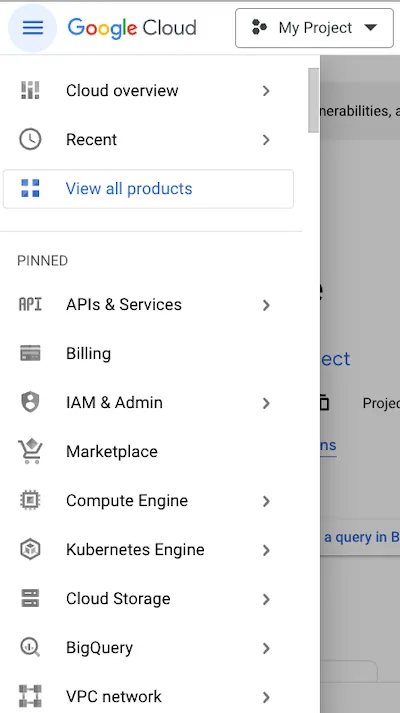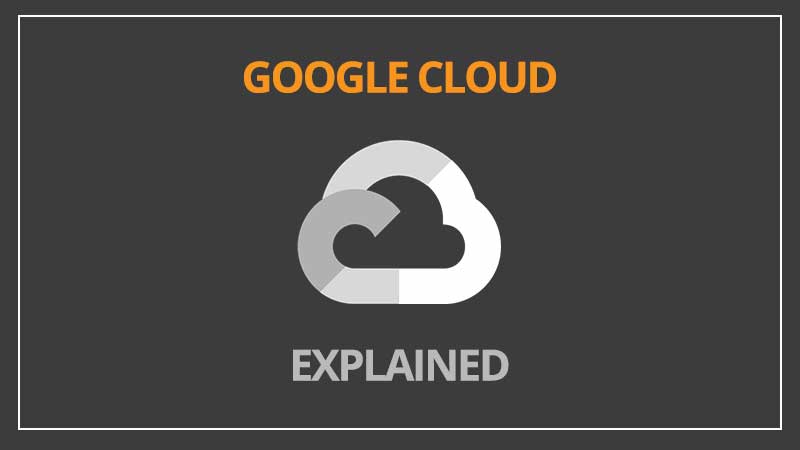What is Google Cloud?
Google Cloud is a suite of cloud computing services that run on the same infrastructure that Google uses internally for its end-user products, such as Google Search and YouTube. These services are designed to provide a scalable, reliable, and low-latency platform for developers to build and host their applications and data on the internet.
Some of the services offered by Google Cloud include computing, storage, databases, analytics, machine learning, and networking.
Simply put, Google Cloud is a set of services and tools offered by Google that allows businesses and organizations to store, process and analyze data, run applications and websites, and handle other IT tasks on Google’s own infrastructure.
Imagine you have a business and you need to store all your important files, like financial reports, customer information, and employee records. Instead of storing them on your own computers, you can use Google Cloud to store them on Google’s servers, which are located all around the world.
This way you can access your files from anywhere and you don’t have to worry about losing them if something happens to your own computers.
Also, imagine that your business wants to create a website or an app to reach more customers or automate some tasks, instead of having to buy and maintain your own servers and software, you can use Google Cloud services to create and run your website or app, and scale it as your business grows.
Google Cloud also offers other services like machine learning, big data, analytics, and more. These services allow businesses to analyze large amounts of data and extract valuable insights, improve their operations and decision-making.
Basically, Google Cloud is a way for businesses to outsource their IT needs to Google, so they can focus on running their business, without having to worry about the underlying technology.
Origin
Google Cloud Platform (GCP) was first announced in April 2008 and released in beta at that time. It was generally available (GA) on May 25, 2011. It was announced as the Google App Engine, a platform for developing and hosting web applications in Google-managed data centers, which was the first service of GCP.
Since then, Google Cloud has expanded to include a wide range of services for computing, storage, networking, big data, machine learning, and more.
Google Cloud products

Google Cloud offers a wide range of products and services that can be used for various purposes such as computing, storage, networking, big data, machine learning, and more. Here are some of the main products and services offered by Google Cloud:
Compute Engine
A service for running virtual machines on Google’s infrastructure.
Kubernetes Engine
A service for running and managing containerized applications.
App Engine
A platform for developing and hosting web applications.
Cloud Storage
A scalable and durable object storage service.
BigQuery
A fully-managed, cloud-native data warehouse for big data analytics.
Cloud SQL
A fully-managed relational database service.
Cloud Spanner
A fully-managed, globally-distributed, and strongly-consistent database service.
Cloud Datastore
A NoSQL document database service.
Cloud Dataflow
A fully-managed service for ETL and batch data processing.
Cloud Data Loss Prevention
A fully-managed service for discovering, classifying, and protecting sensitive data.
Cloud TPU
A service for running machine learning workloads on Google’s Tensor Processing Units.
Cloud AI Platform
A fully-managed service for building, deploying, and scaling machine learning models.
Cloud Translation API
A service for automatically translating text from one language to another.
Cloud Natural Language API
A service for extracting insights from unstructured text.
Cloud Speech-to-Text API
A service for converting spoken audio to text.
The above are only a few of all the products and services offered by Google Cloud. There are many more available, each with its own specific set of features and capabilities. For a list of all products, click the link below.
How can businesses use Google Cloud?
Businesses can use Google Cloud in many, many ways, depending on their specific needs. Here are just a few examples:
Cloud Storage
A company can use Google Cloud Storage to store and retrieve large amounts of data, such as videos, images, and backups. This can be useful for companies that need to store and share large files with employees or customers.
Cloud Computing
A company can use Google Cloud Compute Engine to run their applications and services. This can be useful for companies that need to scale their computing resources up or down as needed, without having to invest in and maintain their own physical servers.
Big Data and Analytics
A company can use Google BigQuery to analyze large sets of data, such as customer data or website logs. This can be useful for companies that need to gain insights from their data, such as identifying patterns or trends.
Machine Learning
A company can use Google Cloud Machine Learning Engine to build, deploy, and run machine learning models. This can be useful for companies that need to automate tasks such as image recognition, natural language processing, or predictive modeling.
Networking
A company can use Google Cloud Networking services to secure and optimize their network traffic. This can be useful for companies that need to provide secure and fast access to their applications and services for their employees and customers.
Does Google Cloud offer free services?
Yes, Google Cloud offers a number of free services and free tiers for some of its products. These free services and free tiers can be used to try out the platform and test out different features before committing to a paid plan. Some of them are:
- Free trial: New customers can sign up for a free trial of Google Cloud and receive $300 in credit to use towards any GCP services.
- Always Free: Google Cloud offers a set of products that are always free. These include Cloud SQL instances, Cloud Firestore usage, and BigQuery storage and queries.
- Free usage limits: Some of the GCP products have a free usage limit each month, after which usage charges will apply.
- Community tutorials and sample code: Google Cloud offers a variety of tutorials and sample code that can help users learn how to use the platform.
- Google Cloud Free Tier: Some of the GCP products like Compute Engine, Kubernetes Engine, and Cloud Storage provide a free tier with a limited amount of usage each month.
It’s worth noting that some of the free services and free tiers may have certain limitations and restrictions, and usage beyond the free limits will incur charges. It’s always a good idea to check the pricing and details of the services you plan to use before getting started.
The Google Cloud Console
The Google Cloud Console is a web-based user interface that allows users to manage their resources and services on the Google Cloud Platform (GCP). It provides a central location for users to manage their projects, resources, and services, and allows users to perform a variety of tasks, such as creating and managing virtual machines, configuring network settings, creating and managing databases, and monitoring resource usage and performance.
The Console is an easy-to-use interface for managing resources and services on GCP, and it is accessible from any web browser. It is designed to be intuitive and user-friendly, even for users who are not experienced with cloud computing.
It also provides access to a range of tools and services, such as Cloud Shell, Cloud Debugger, and Cloud Source Repositories, which are designed to help developers and IT professionals manage their applications and services more effectively.


How Google Cloud compares to its main competitors: Amazon AWS and Microsoft Azure
Google Cloud Platform (GCP), Amazon Web Services (AWS), and Microsoft Azure are the leading cloud computing platforms that offer a wide range of products and services for various purposes such as computing, storage, networking, big data, machine learning, and more.
When comparing GCP, AWS, and Azure, some key differences to consider include:
Scale
All three platforms have a large global footprint, but AWS is currently the largest with the most extensive range of services and the largest user base. GCP and Azure follow closely behind.
Pricing
All three platforms have a pay-as-you-go pricing model, but they differ in terms of pricing structure and discounts. AWS and Azure tend to have more complex pricing models, while GCP has a more straightforward pricing structure.
Services
All three platforms offer a wide range of services, but they differ in terms of the specific services offered and their level of integration. AWS and Azure have more services available than GCP, but GCP has strong capabilities in the areas of big data, machine learning, and artificial intelligence.
Integration
AWS and Azure have a larger ecosystem of third-party integrations and partners, while GCP has a more limited ecosystem.
Ease of use
All three platforms have a wide range of tools and resources available to help users navigate their respective platforms. AWS and Azure have more complex interfaces and can be difficult for beginners to navigate, while GCP has a more straightforward and user-friendly interface.
The best one for you will depend on your specific needs and use cases. It’s a good idea to evaluate the features and pricing of each platform and test them out to see which one works best for you.
Things you should know
Amazon Web Services (AWS) is widely considered to be the market leader in the cloud computing market, with a large and mature set of services and a strong customer base. AWS has been around since 2006 and has a large number of services and offerings, which are well-established and widely used.
Microsoft Azure is a growing player in the cloud computing market and is widely adopted by a large number of organizations. Azure has a strong focus on enterprise customers and offers a comprehensive set of services and tools, which are designed to integrate well with other Microsoft products and services.
Google Cloud is a newer player in the cloud computing market, but has made significant progress in a relatively short period of time. Google Cloud is known for its innovative technology, including its machine learning and AI offerings, and has a strong focus on the needs of data-intensive applications.
How can Google Cloud be used in e-commerce?
Google Cloud can be used in many ways to support and enhance e-commerce. Some of them include:
Website Hosting
Google Cloud provides a range of services for hosting websites, including App Engine and Compute Engine, which can be used to host e-commerce websites and handle high traffic spikes during peak periods.
Content Delivery Network (CDN)
Google Cloud’s CDN service, Cloud CDN, can be used to deliver fast and reliable content to customers, anywhere in the world, by caching content closer to end-users.
Database Management
Google Cloud offers a range of database services, including Cloud SQL and Firestore, which can be used to store, manage and access customer data, product information and transaction details, ensuring fast and reliable access to data.
Payment Processing
Google Cloud integrates with various payment processing services, such as PayPal and Stripe, to provide secure and seamless payment processing for online transactions.
Big Data and Analytics
Google Cloud’s Big Data and Analytics services, such as BigQuery and Cloud Dataflow, can be used to analyze customer data and gain valuable insights into customer behavior, sales trends, and other key metrics, enabling e-commerce businesses to make data-driven decisions.
Machine Learning
Google Cloud’s machine learning services, such as AutoML and Cloud AI Platform, can be used to build and deploy custom machine learning models to personalize the customer experience, improve product recommendations and enhance fraud detection.
As you can see, Google Cloud offers a comprehensive set of services that can support all aspects of e-commerce, from website hosting and content delivery to data management, payment processing, big data and machine learning, enabling e-commerce businesses to focus on delivering the best possible customer experience.
Example of Google Cloud usage
Here’s a practical example of how a hypothetical e-commerce company, “Fashion Forever,” can use Google Cloud:
Website Hosting: Fashion Forever uses Google Cloud’s App Engine to host their e-commerce website, which receives millions of visitors every month. The website is fast, reliable, and can scale automatically to handle traffic spikes during peak periods, such as holidays and flash sales.
Content Delivery Network (CDN): To deliver fast and reliable content to customers, anywhere in the world, Fashion Forever uses Google Cloud’s Cloud CDN service. The CDN caches images, videos, and other assets closer to end-users, ensuring fast load times and a great customer experience.
Database Management: Fashion Forever uses Google Cloud’s Cloud SQL to store and manage customer data, product information, and transaction details. The data is secure, accessible, and easy to manage, enabling Fashion Forever to provide fast and reliable customer service.
Payment Processing: To process online transactions, Fashion Forever integrates with Google Cloud’s partner, Stripe. The integration is secure, seamless, and provides fast and reliable payment processing, ensuring a great customer experience.
Big Data and Analytics: To gain valuable insights into customer behavior, sales trends, and other key metrics, Fashion Forever uses Google Cloud’s BigQuery and Cloud Dataflow. The big data and analytics services allow Fashion Forever to analyze large amounts of data and make data-driven decisions, improving the customer experience and driving sales.
Machine Learning: To personalize the customer experience, improve product recommendations, and enhance fraud detection, Fashion Forever uses Google Cloud’s Cloud AI Platform. The machine learning services enable Fashion Forever to build and deploy custom machine learning models, providing a more personalized and secure shopping experience.
By using Google Cloud, Fashion Forever is able to provide a fast, reliable, and personalized e-commerce experience to its customers, while focusing on running its business, instead of managing IT infrastructure.
Companies that use Google Cloud
Google Cloud has a diverse customer base, which includes startups, enterprises, and government organizations. Here are a few well-known companies that use it:
Spotify
The music streaming company uses Google Cloud to store and process large amounts of user data, including music playlists and user preferences.
Best Buy
The electronics retailer uses Google Cloud to process and analyze large amounts of customer data, including purchase history and customer preferences, to provide personalized recommendations and offers to customers.
HSBC
The financial services company uses Google Cloud to process and analyze large amounts of financial data, including customer transactions and account information, to improve customer experiences and streamline internal processes.
Coca-Cola
The beverage company uses Google Cloud to process and analyze large amounts of sales data, including sales by product, region, and channel, to gain valuable insights and improve business performance.
Philips
The electronics and healthcare company uses Google Cloud to store and process large amounts of medical data, including patient information and health records, to improve patient outcomes and support research initiatives.
Snap Inc.
The social media company uses Google Cloud to store and process large amounts of user data, including images and videos, to provide a fast and seamless user experience for Snapchat users.
The companies above are just a few examples. Google Cloud is widely adopted by a diverse range of organizations, due to its innovative technology, comprehensive set of services, and industry-leading security and reliability.
Google Cloud AI tools
Google Cloud offers a range of AI (Artificial Intelligence) tools and services that enable companies to build, deploy, and scale AI solutions. Some of them include:
AutoML
A suite of machine learning tools that enable organizations to build custom models with ease, without having to write complex code or hire AI experts.
Cloud AI Platform
A comprehensive platform for building, deploying, and managing machine learning models at scale.
Cloud Vision API
An API that enables organizations to extract insights from images and videos, such as text recognition, face detection, and image labeling.
Cloud Speech-to-Text
An API that converts audio to text in real-time, enabling organizations to transcribe and analyze voice data.
Cloud Natural Language API
An API that enables organizations to analyze and extract insights from text data, such as sentiment analysis, entity recognition, and content classification.
Cloud Translation API
An API that enables organizations to translate text from one language to another, in real-time.
Cloud Video Intelligence API
An API that enables organizations to extract insights from video content, such as scene detection, label recognition, and shot change detection.
Google Cloud and Google Ads
Google Cloud and Google Ads can be connected and integrated to enhance the performance of advertising campaigns.
Google Cloud provides various tools, such as BigQuery and Cloud Dataflow, for processing and analyzing large amounts of data, which can be used to gain valuable insights into customer behavior and campaign performance. This data can then be used to optimize and improve the performance of Google Ads campaigns, increasing the return on investment (ROI) and driving more sales.
Additionally, Google Cloud’s machine learning services, such as AutoML and Cloud AI Platform, can be used to build and deploy custom machine learning models, which can be integrated with Google Ads to improve the targeting and relevance of advertising campaigns.
By integrating Google Cloud with Google Ads, companies can gain a more complete view of their customers and campaigns, enabling them to make data-driven decisions and improve the performance of their advertising efforts.
